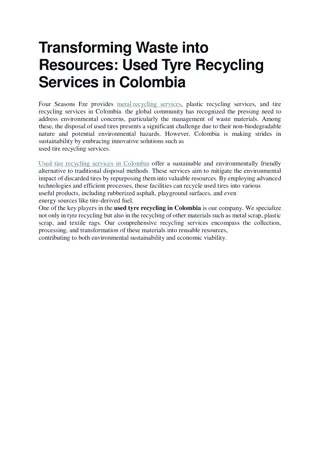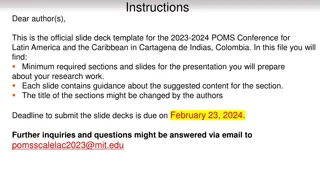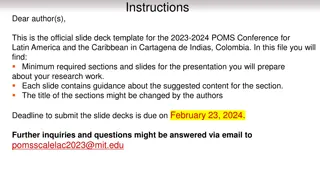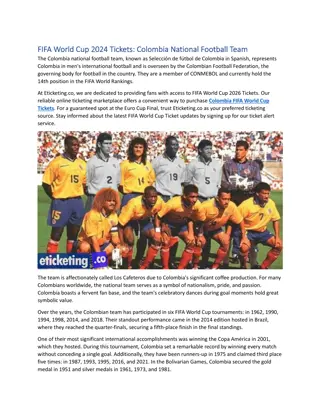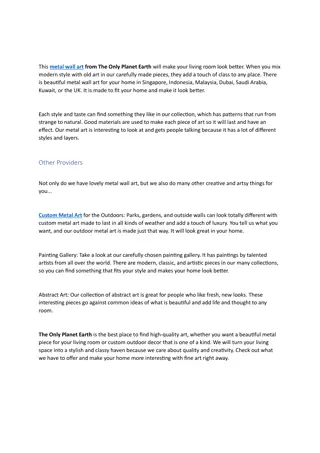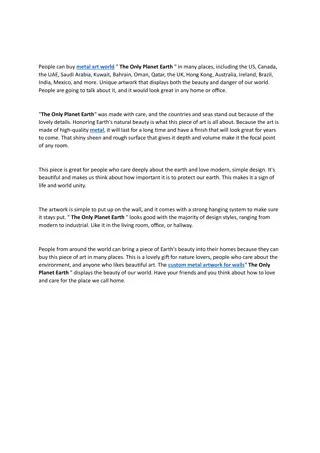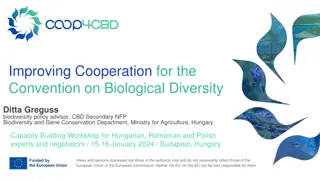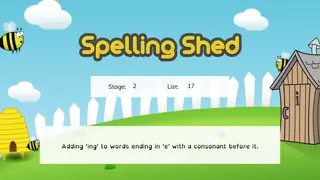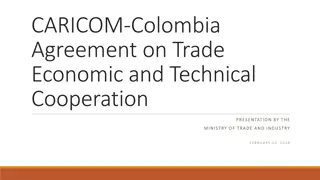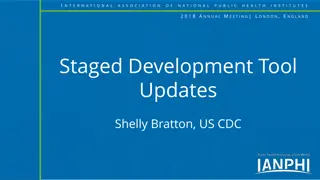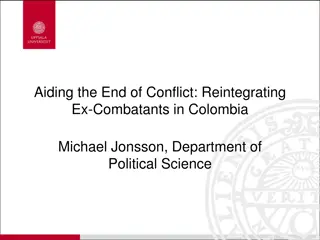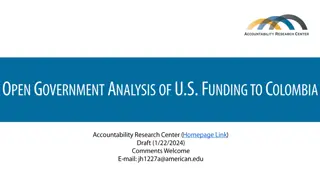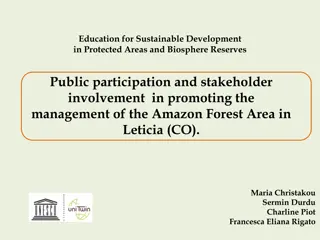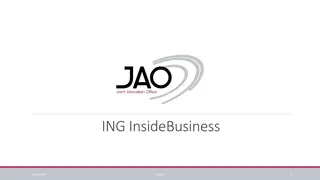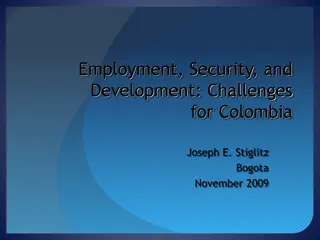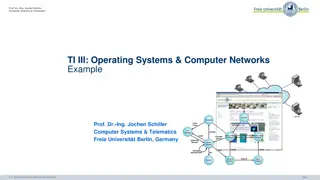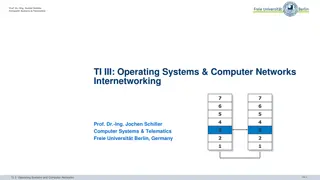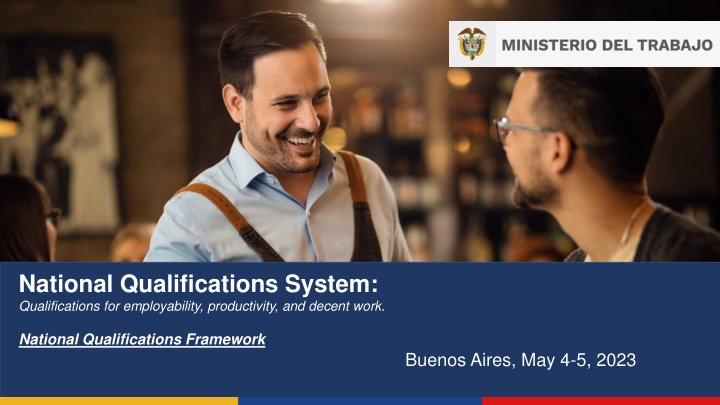
National Qualifications System and Framework in Buenos Aires 2023
Explore the National Qualifications System and Framework focusing on employability, productivity, and decent work. Learn about the Competence Assessment, Certification, and Training Subsystems for work quality assurance. Discover the three Qualification Tracks of the system, including Recognition of Previous Learning and Development for Work Education. Dive into the Development of the National Qualifications Framework in Colombia and its international actions toward human resources development.
Download Presentation

Please find below an Image/Link to download the presentation.
The content on the website is provided AS IS for your information and personal use only. It may not be sold, licensed, or shared on other websites without obtaining consent from the author. If you encounter any issues during the download, it is possible that the publisher has removed the file from their server.
You are allowed to download the files provided on this website for personal or commercial use, subject to the condition that they are used lawfully. All files are the property of their respective owners.
The content on the website is provided AS IS for your information and personal use only. It may not be sold, licensed, or shared on other websites without obtaining consent from the author.
E N D
Presentation Transcript
National Qualifications System: Qualifications for employability, productivity, and decent work. National Qualifications Framework Buenos Aires, May 4-5, 2023
National Qualifications System National Qualifications Framework Decree 1649 of 2021 Competence Assessment and Certification Subsystem Decrees 946 and 947 of 2022. Training Subsystem for Work and its Quality Assurance Decree 1650 of It is defined as a set of policies, instruments, components and processes necessary to align education and training with the social and productive needs of the country, and that promotes the recognition of learning, the personal and professional development of citizens, the labor insertion or reintegration and productive development of the country. 2021 National Qualifications System Competence Standardization Subsystem Decree 945 of 2022 Educational and Training Mobility Scheme SNC Information Platform
The 3 Qualification Tracks of the SNC RECOGNITION OF PREVIOUS LEARNING Track DEVELOPMENT FOR WORK EDUCATION The Learning Results that a person obtains upon completing and approving a formal education or ETDH program, designed using the Sectoral Catalogs as a reference and according to the levels of the MNC, are acquired and recognized. Learning obtained throughout life by a person is recognized, regardless of where, when and how they were acquired. Recognition will be granted through competency evaluation and certification processes mechanisms, taking the SNC Learning Results as a reference. The Learning Results that a person obtains upon completing and approving a FT program designed using the Sectoral Qualifications Catalogs as a reference, following the guidelines of the SNC and in accordance with the levels of the MNC, are acquired and recognized. Characteristics Qualifications or other Preschool, Basic, Middle and Higher (U and TyT) Access and mobility throught education, training and work Work Training Drives to Certificates of Competences and Qualifications Titles Certificates
Development of MNC in Colombia The MNC of Colombia is currently being implemented. 2023 2022 Implementation of qualification- based offer. Implementation of the institutional framework and governance. Design and approval of qualifications. Accompaniment and offer FT. 2021 2019 Regulation: Regulatory decrees of the CUOC, MNC and SFT. 2016 - 2018 Conceptualizatio n and structuring of the MNC: route, matrix and catalogs Law 1955, Art. 194: Creation of the SNC for Colombia 2015 2014 Law 1753: Creation of the MNC. Formation of the MNC technical team. 2010 First proposal of the MNC: prepared from the Labor Sector. Conpes 3674: Policy to strengthen the Human Capital Training System - At the international level, the following actions stand out: - Recommendation 195, on the development of human resources ILO, 2004. Recommendation on Technical and Vocational Education and Training (TVET) - UNESCO, 2015. 2030 Agenda for Sustainable Development, UN General Assembly - UN, 2015. - -
National Qualifications Framework It is defined as the instrument that allows Qualifications to be structured and classified in a scheme of eight (8) levels ordered and expressed in terms of Knowledge, Skills and Attitudes, applicable in study, work or both contexts, according to the sequentiality and complexity of the learning that people achieve in the different Qualification Tracks. Due to its coverage, it contains all occupations, economic sectors and educational and training levels or subsystems. Inclusive Due to the scope of its content, it is a benchmark for the curricular design of the programs of the educational and training offer; does not venture into the organization, nor into the objectives and contents of the associated training Not comprehensive Esquema de Movilidad Educativa y Formativa Ministerio de Educaci n Nacional Because of its function is mainly for communication and facilitation Flexible
Objectives of the Colombian MNC 1. Educational, training and labor mobility, national and international. Subsistema de Evaluaci n y Certificaci n de Competencias Decretos 946 y 947 de 2022. Ministerio del 3. Interaction between government actors, the productive, labor, educational, training and social sectors. 2. Coordination of qualifications and qualification pathways Trabajo 5. Relevance and quality of qualifications. 6. Closing human talent gaps. Esquema de Plataforma de Informaci n del Movilidad Educativa y Formativa 7. Recognition of titles and certificates in the labor market. SNC Ministerio de Ministerio del Trabajo Educaci n Nacional
Preparation of Qualifications 03 Normalization of Competences 02 04 Qualifications entail: Occupational profiles Qualifications (Learning Outcomes) 1. Knowledge 2. Skills 3. Attitudes expressed in Autonomy and Responsibility 01 Gaps study 05 Evaluation and RELEVANCE from the CNS certification Quality assurement
Qualifications Catalogs Catalog of National Qualifications Group the sectorial catalogs Sectoral Catalogs Sectoral Catalogs Group the qualifications Qualification structures Qualifications Qualifications Qualifications Qualifications
MNC descriptor matrix Knowledge Skills Attitudes (Autonomy and Responsibility) Possesses highly advanced knowledge on the border of a disciplinary or interdisciplinary field or of a productive context. Create or redefine principles, theories, products, solutions and new work or study methodologies. Creates or redefines knowledge to solve critical and multidimensional problems in unpredictable contexts of a disciplinary or work field, through the generation of new research methodologies and the use of advanced and specialized skills and techniques. It clearly sustains the results from scientific and technological research to a specialized public or not, in a field of the most advanced innovation. It acts autonomously and is responsible for strategic decisions that generate social, economic and cultural changes. Demonstrates academic and employment integrity and ongoing commitment to developing new knowledge or processes. Advanced knowledge for the development of scientific, applied and high technology research in a field of study or for the management of areas of organizations in the productive sector in a field of work. Formulates and develops innovative and creative solutions to complex problems that require the development of strategic or research projects and the application of new technical-scientific approaches in unpredictable and multidisciplinary contexts. Analyze, synthesize, evaluate and communicate strategic and complex information in a work or study context. Demonstrates autonomy and responsibility in decision-making to formulate and develop strategic or research projects. Takes responsibility for resources and work or research groups to achieve the expected results in work or study contexts. Possess broad and integrated practical theoretical knowledge of different theories, perspectives and approaches in a specific field of work or study. Analyzes specific information in the management of projects and processes. Defines and manages projects and processes in a field of work or study, through the analysis and evaluation of specific information in various contexts. Proposes solutions to disciplinary and interdisciplinary problems; designs or improves processes with new methods and procedures. Analyzes and communicates information, knowledge, ideas and solutions in the educational and work environment. Acts autonomously and responsibly in decision-making regarding human talent, administrative, financial and technical resources, and is responsible for the results of projects and processes in various contexts of their field of work or study. Guides and evaluates work or study teams to achieve objectives. Possess specific theoretical, practical and technological knowledge in a field of study or work. Integrates and transfers knowledge to innovate processes. Applies specialized methods, techniques and technologies in solving various problems or in the implementation and coordination of processes, analyzes and communicates information generated in a work or study environment. Responds to and supervises the activities of others in work or study contexts; coordinates and makes decisions for the technical and operational work of the processes and assumes responsibility for physical and technological resources. Possesses theoretical and practical knowledge necessary for the interpretation and development of procedures, methods and techniques in study or work contexts. Selects and applies procedures in performing routine and non-routine activities, and solves problems in predictable and sometimes unpredictable contexts. Works or studies independently, supervise the routine work of others, assume responsibility for the procedures and changes that may be generated in their context. Possesses general theoretical and practical knowledge of concepts, principles, techniques, methods and procedures in study or work contexts Applies techniques and methods and operates teams in carrying out routine activities and solving problems in familiar work or study contexts. Works or studies with autonomy and responsibility in the execution of the assigned activities. Requires supervision on the results of their learning or job performance. Possesses theoretical and factual knowledge, assimilating basic information in study or work contexts Performs routine activities, use instruments and solve simple problems in familiar work or study contexts. Works or studies with moderate supervision and is responsible for the execution of the assigned activities. Possesses knowledge of basic facts to act in the social, educational or productive context that facilitates learning throughout life Executes simple and repetitive tasks following detailed and specific instructions in familiar work or study contexts. Works or studies under direct supervision and answers for the assigned tasks.
Institutionality and governance of the MNC Ministry of Labor Ministry of Education Guidelines of the National Qualifications Framework Executive Committee of the National Qualifications Framework -Decision-making body and approval of qualifications .Designs public policies and guidelines Technical Secretariat of the committees Qualifications committee - Committee support body -Advisory body
Challenges Existence of types of qualifications, one from the educational path, and another from training for work. Usability of the qualifications by the supplying institutions and the actors in the productive sector. The difference in the units of measurement of learning, between the educational and training pathways, for mobility between them. It is a challenge to build comparable quality systems to be applied to the different qualification pathways.
Lessons learned Qualifications are an effective dialogue between the social and productive demands of human talent and the education and training of people for their social and labor activities. The relevance of the learning and the quality of the learning results organized in the Qualifications Framework are a commitment for the Government with a view to sustainable human and social development. They are a recognition of the weight of education and training for work in the path of insertion, reinsertion or job retraining for all.


